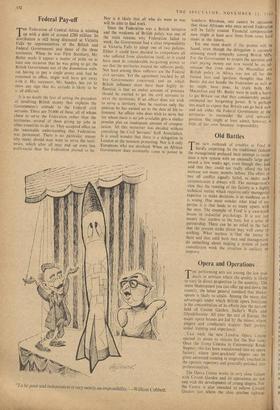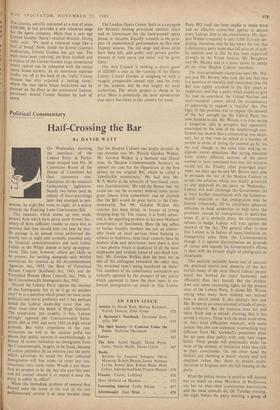Opera and Operations
fIIE performing arts arc among the few pro- ducts or services where the quality is likely to vary in direct proportion to the quantity. The more Shakespeare you can offer up and down the country, the better general standard that Shake- speare is likely to attain. Among the many dis- advantages under which British opera functions is the concentration of its efforts into the narrow field of Covent Garden, Sadler's Wells and Glyndebourne. All over the rest of Europe the major opera houses are fed by the minor, where singers and conductors acquire their profes- sional training and experience.
• Last week the new London Opera Centre. opened its doors to visitors for the first time. Once the Troxy Cinema in Commercial Road, Stepney, this has been transformed into an opera factory, where 'post-graduate' singers can be given advanced training in stagecraft, coached in the operatic repertory and generally polished into professionalism.
The Opera Centre works in very close liaison with Covent Garden and its operations do not end with the development of young singers. For the Centre is also intended to relieve Covent- Garden just where the shoe pinches tightest. 1 he cinema, adroitly converted at a cost of some £100,000, at last provides a new rehearsal stage for the opera company. More than a year ago Covent Garden Opera's musical director, Georg Solti, said: 'We need a rehearsal stage like a loaf of bread.' Now, inside the former cinema's auditorium, Covent Garden has got one The seats have been removed, the floor levelled and a replica of the Covent Garden stage constructed where operas can be rehearsed with the actual opera house scenery. In an enormous separate studio, cut off at the back of the 'stalls,' Covent Garden has also acquired a - 'netting room,' where the vast opera house backcloths can be painted on the floor in the continental fashion, previously denied Covent Garden by lack of space.
The London Opera Centre, both as a surrogate for Britain's missing provincial operatic chain and as lebensraum for the hard-pressed opera house, is valuable. Equally valuable is the pros- pect of experimental performances in this new Stepney annexe. The old stage and dress circle have been left, and public and private perfor- mances of both opera and ballet will be given there.
The Arts Council is making a direct grant of £20,000 a year to the running of the Opera Centre, Covent Garden is weighing in' with a roughly comparable annual sum, and the costs of the students will be met largely by local authorities. The whole project is cheap at its price: Here is potentially the most adventurous step opera has taken in this country for years.



































 Previous page
Previous page